VERY SCARCE 1963 March on Washington CIVIL RIGHTS MARCHER Protest Cause Pin
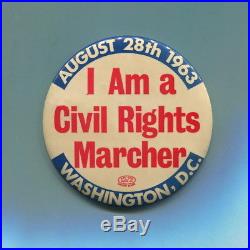
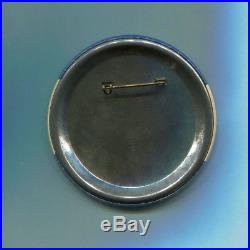
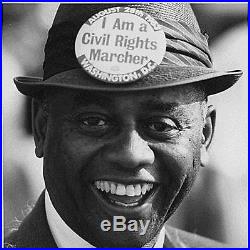
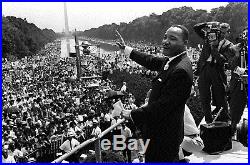
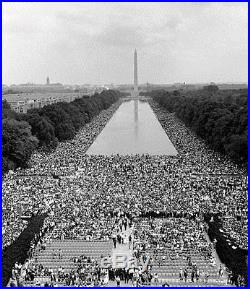

THIS IS A 3 INCH CELLULOID PINBACK BUTTON IN WHAT I BELIEVE TO BE IN REALLY NICE CONDITION. HOWEVER, THAT IS JUST MY OPINION. SEE PHOTOS OF FRONT AND BACK FOR CONDITION, AND YOU BE THE JUDGE.
SEE MY OTHER LISTINGS FOR MORE GREAT CIVIL RIGHTS AND OTHER POLITICAL CAUSES AND MOVEMENTS. This very scarce pin was issued at the historic March on Washington for Jobs and Freedom, held on August 28, 1963 in Washington D. Kin delivered his "I have a Dream" speech.
(See photos of event and participant wearing an example of the pin at the march, which are for illustration only, and not included with the sale of this pin). The March on Washington for Jobs and Freedom , the March on Washington, or The Great March on Washington, was held in Washington, D. On Wednesday, August 28, 1963. The purpose of the march was to advocate for the civil and economic rights of African Americans. At the march, Martin Luther King Jr.
Standing in front of the Lincoln Memorial, delivered his historic " I Have a Dream" speech in which he called for an end to racism. The march was organized by A. Philip Randolph and Bayard Rustin , who built an alliance of civil rights, labor, and religious organizations that came together under the banner of jobs and freedom. Estimates of the number of participants varied from 200,000 to 300,000 ; the most widely cited estimate is 250,000 people.
Observers estimated that 75 80% of the marchers were black. The march was one of the largest political rallies for human rights in United States history. The march is credited with helping to pass the Civil Rights Act of 1964 and preceded the Selma Voting Rights Movement which led to the passage of the Voting Rights Act of 1965.
N July 10, 1964, a group of African American men in Jonesboro, Louisiana. Led by Earnest Chilly Willy Thomas and Frederick Douglas Kirkpatrick founded the group known as The Deacons for Defense and Justice to protect members of the Congress of Racial Equality (CORE). Against Ku Klux Klan violence. Most of the Deacons were veterans of World War II. The Jonesboro chapter organized its first affiliate chapter in nearby Bogalusa, Louisiana led by Charles Sims, A.Eventually they organized a third chapter in Louisiana. The Deacons tense confrontation with the Klan in Bogalusa was crucial in forcing the federal government to intervene on behalf of the local African American community. The national attention they garnered also persuaded state and national officials to initiate efforts to neutralize the Klan in that area of the Deep South. The Deacons emerged as one of the first visible self-defense forces in the South and as such represented a new face of the civil rights. Traditional civil rights organizations remained silent on them or repudiated their activities.
They were effective however in providing protection for local African Americans who sought to register to vote and for white and black civil rights workers in the area. The Deacons, for example, provided security for the 1966 March Against Fear from Memphis to Jackson, Mississippi. Moreover their presence in Southeastern Louisiana meant that the Klan would no longer be able to intimidate and terrorize local African Americans without challenge. The strategy and methods that the Deacons employed attracted the attention and concern of the Federal Bureau of Investigation (FBI), which authorized an investigation into the groups activities. The investigation stalled, however, when more influential black power organizations such as US and the Black Panther Party. Emerged after the 1965 Watts Riot. With public attention, and the attention of the FBI focused elsewhere, the Deacons lost most of their notoriety and slowly declined in influence.By 1968 they were all but extinct. In 2003 the activities of the Deacons was the subject of a 2003, Deacons for Defense. On July 10, 1964, a group of African American men in Jonesboro, Louisiana. This underground pinback button pin or badge relates to the Hippie (or Hippy) Counterculture Movement of the psychedelic Sixties (1960's) and Seventies (1970's). That movement included such themes and topics as peace, protest, civil rights, radical, socialist, communist, anarchist, union labor strikes, drugs, marijuana, pot, weed, lsd, acid, sds, iww, anti draft, anti war, anti rotc, welfare rights, poverty, equal rights, integration, gay, women's rights, black panthers, black power, left wing, liberal, etc.
Progressive political movement and is guaranteed to be genuine as described. THIS IS MY HOBBY AND IS NOT A BUSINESS.IF YOU ARE NOT A MEMBER, YOU SHOULD CONSIDER JOINING. IT IS A GREAT ORGANIZATION! THANK YOU FOR YOUR INTEREST. The item "VERY SCARCE 1963 March on Washington CIVIL RIGHTS MARCHER Protest Cause Pin" is in sale since Friday, March 02, 2018.
This item is in the category "Collectibles\Historical Memorabilia\Political\US\Peace & Anti-War Movements". The seller is "causenik" and is located in Ojai, California. This item can be shipped worldwide.
